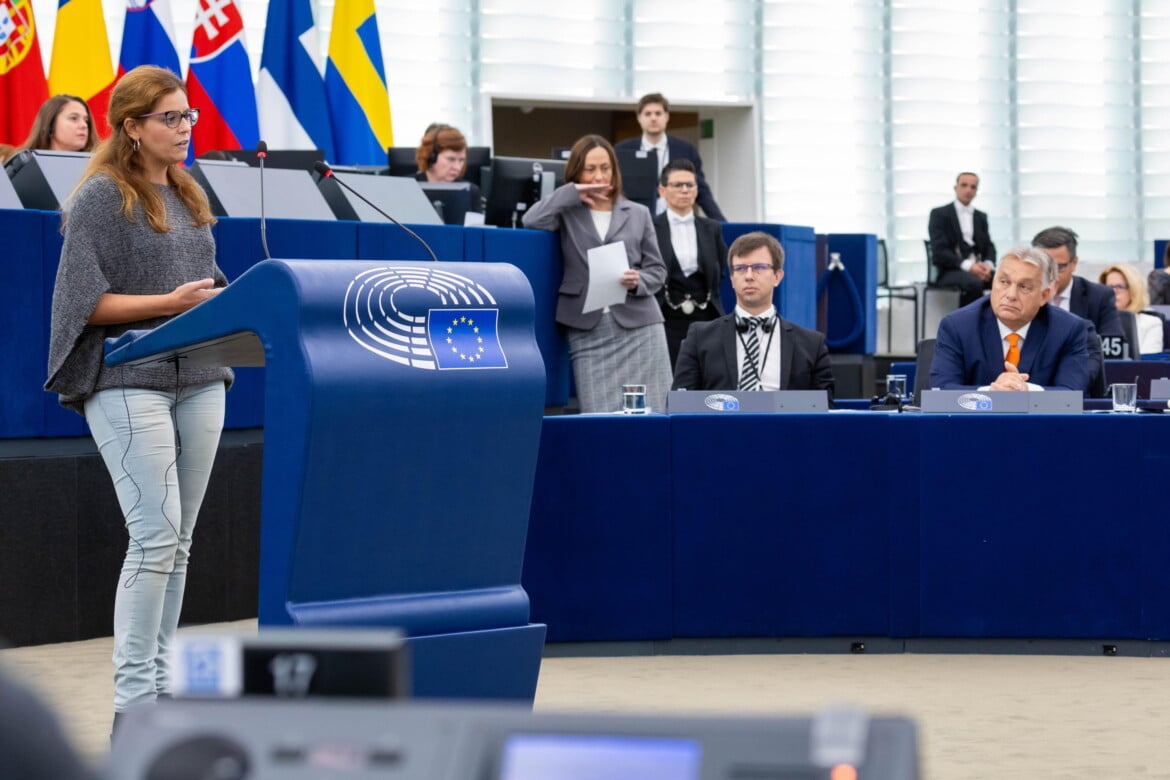Interview
Ilaria Salis: ‘The fascist campaign against me will get even uglier’
We spoke with the Italian member of European Parliament and former political prisoner in Hungary. ‘The Italian government looks to Orbán as a source of inspiration instead of seeing him as a wave to protect ourselves from.’

Ilaria Salis has just cleared the first hurdle: the European Parliament's Committee on Legal Affairs (JURI) has voted by a narrow 13-to-12 majority to uphold her parliamentary immunity.
The deciding votes came from members of the European People's Party (EPP), which is split on the issue: two of its representatives rejected the report that would have sent the Italian anti-fascist back to a Hungarian prison. When we spoke with Salis, she expressed satisfaction and cautious optimism as she awaits the final vote in the plenary session.
“We have to wait until October 7,” she says, “but for now, we welcome this important result. It gives us hope, but we are waiting for the final decision. I am confident, but I also know that the campaign against me from the far right and fascists will now become even uglier. We have to keep our guard up.”
In recent days, you appealed to the elected members of the EPP, reminding them of the European Union's numerous complaints about the rule of law in Hungary. Did you expect this outcome?
I didn’t have any expectations. The JURI committee’s procedure is very secretive; they meet behind closed doors and cast a secret vote. For my part, I hoped they would recognize the situation in Hungary, especially after the Budapest government’s recent statements equating anti-fascists with terrorists.
What does the committee’s vote represent?
It is yet more proof that it’s impossible for me to get a fair trial in Hungary. And it’s not just about me; I am thinking of Maya, who is still in prison there and is facing sentencing in October. So, after the opinions of various judges in the EU – in Italy, France, and Germany – we have yet another piece of evidence about the state of human rights in Hungary. And that is why today I want to bring to mind all the comrades who are in prison with Maya, targeted by the Hungarian regime.
You have turned your personal case into a political battle. Has it been successful?
I always try to see the general principle in the particular case. This is an important battle for everyone. It serves to defend democratic guarantees and rights, which were won through struggle and are the basic principles of the rule of law – and they are not guaranteed forever. We obtained these guarantees when the people rebelled, and now the sovereignist governments in Europe are threatening them. They want to turn back the clock. These rights don’t just exist within a liberal paradigm; they are the legacy of past struggles. That is another reason they must be defended.
Is your story emblematic of a broader attack on rights?
Look at the right to dissent, which they want to chip away at. In Hungary, there is always a public enemy: today it’s the anti-fascists; we saw it before with the ban on Pride. We need a collective shield against this kind of criminalization.
Is Meloni’s Italy a variation on this model?
Unfortunately, yes. The Italian government looks to Orbán as a source of inspiration instead of seeing him as a wave to protect ourselves from. The path they have taken is clearly headed in that direction. As soon as the Hungarian president came to power, he implemented reforms that dismantled the pillars of democracy. Some of the Meloni government’s reforms – I’m thinking of the justice reform, and especially the push for a directly elected prime minister – are moving in the same direction: disrupting the balance of powers and strengthening the executive. So yes, I see a parallel.
Now they also share the common tactic of exploiting the murder of Charlie Kirk to attack their opponents.
The far right creates hate campaigns. I can testify to that, based on the one they built around me. And then they are ready to exploit any news event in bad faith in order to criminalize dissent. After anti-fascists, migrants, and other minorities, anyone could end up in the crosshairs of their hatred. I find this attempt to flip the script quite pathetic.
In recent months, you have traveled all across Italy, in part to meet the people whose votes got you out of prison. What did you encounter on your journey?
It’s been very interesting. I always like to listen and understand what’s going on, even in the smallest places. I have faith that change happens from the bottom up, as the mobilizations for Palestine prove. We must be aware of the era we are in, but we also have to be positive. In these meetings, I feel a sense of confidence that we can truly become a force for change. There are many people who refuse to give up and who are fighting, each in their own way. My own story shows this: the outpouring of support I’ve received is a symptom of the fact that there are many people who want to fight against injustice.
You have requested to be tried in Italy. Why?
I have been emphasizing these days that keeping my immunity does not mean the trial shouldn’t take place. I want the trial to be held in Italy. For that to happen, the Italian authorities need to intervene: the Minister of Justice could allow the trial to proceed even while I have immunity. I have been asking for this since I was in prison in Budapest. It’s not clear why they haven’t done it. Maybe it suits them better this way. Or maybe they want to see me in chains in Orbán’s Hungary.
Originally published at https://ilmanifesto.it/salis-la-spunta-al-juri-contro-di-me-campagne-dodio-dei-sovranisti on 2025-09-24
